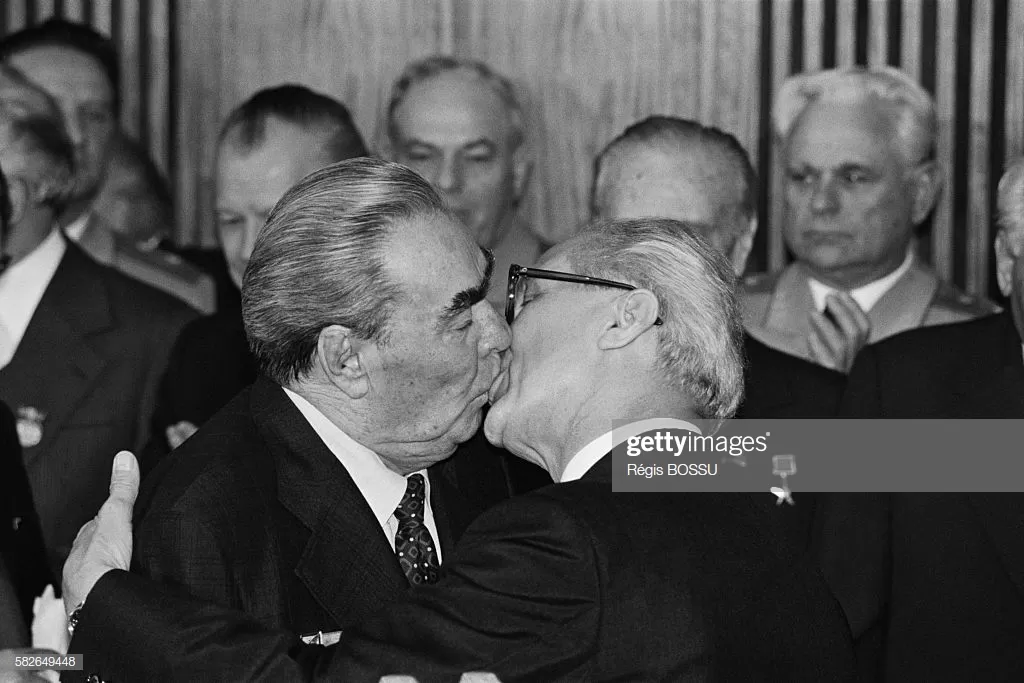Leonid Brezhnev (Politician), born on December 19, 1906 in Kamenskoye, Yekaterinoslav Governorate, Russian Empire (Now Ukraine). Leonid Brezhnev's age 75 years (at death) & Zodiac Sign Sagittarius, nationality Russian (by birth) & Race/Ethnicity is Mixed (Russian, Ukrainian). Let's check, How Tall is Leonid Brezhnev?
Leonid Brezhnev Bio
Leonid Brezhnev Height
5 Feet 8 Inches (172.72 cm/1.72 m)
| Height & Weight | |
|---|---|
| Height (in Feet-Inches) | 5 Feet 8 Inches |
| Height (in Centimeters) | 172.72 cm |
| Height (in Meters) | 1.72 m |
| Weight (in Kilograms) | 76 kg |
| Weight (in Pounds) | 167.55 lbs |
Leonid Brezhnev Body Measurements
Leonid Brezhnev's full body measurements are 43 inches (109.22 cm) - 14.5 inches (36.83 cm) - 34 inches (86.36 cm).
| Body Measurements | |
|---|---|
| Measurements | 43-34-14.5 inches/ 109.22-86.36-36.83 cm |
| Chest Size | 43 inches (109.22 cm) |
| Biceps Size | 14.5 inches (36.83 cm) |
| Waist Size (Male) | 34 inches (86.36 cm) |
Leonid Brezhnev FAQs
Why is Leonid Brezhnev important?
In 1976, Brezhnev became the first party leader since Joseph Stalin to hold the title of marshal of the Soviet Union, the USSR’s highest military rank. In 1977, he assumed the presidency of the USSR, thus becoming the most powerful Soviet leader since Stalin.
Do Russians like Brezhnev?
According to a 2006 Public Opinion Fund poll, 61 percent of the Russian people viewed the Brezhnev era as good for the country. A poll by the VTsIOM in 2007 showed that the majority of Russians would choose to live during the Brezhnev era over any other period of 20th-century Russian history.
What did Leonid Brezhnev believe in?
The Brezhnev Doctrine was a Soviet foreign policy that proclaimed any threat to socialist rule in any state of the Soviet bloc in Central and Eastern Europe was a threat to them all, and therefore justified the intervention of fellow socialist states.
Was Leonid Brezhnev part of the Cold War?
Leonid Brezhnev was the leader of the Soviet Union for 18 years during the height of the Cold War from 1964 to 1982. His leadership is known for its massive build up of nuclear arms, but at great cost to the Soviet economy.
Leonid Brezhnev was born on December 19, 1906 in Kamenskoye, Yekaterinoslav Governorate, Russian Empire (Now Ukraine). He was born to Ilya Yakovlevich Brezhnev, a metalworker, and Natalia Denisovna in Kamenskoe (presently Dniprodzerzhynsk, Ukraine). Leonid Brezhnev witnessed a civil war during his childhood days.
He joined the Communist Party youth organization, the Komsomol in 1923. This organisation used to express its opposition against the idea of possessing private property. After graduating from the Dniprodzerzhynsk Metallurgical Technicum in 1935, he started working as a metallurgical engineer in the iron and steel industry, in Ukraine. At that time, Soviet leader Joseph Stalin ordered peasant farmers to sell their surplus grain to the state instead of preserving it for themselves. To follow Stalin’s order, Leonid tortured the peasants to get their co-operation.
From 1935 to 1936, he served his compulsory military period. Thereafter, he acted as a political commissar in a tank factory. It was in 1936, when he became director of the Dniprodzerzhynsk Metallurgical Technicum. In the year 1936, he was transferred to the regional centre of Dnipropetrovsk. He acquired the position of an important party leader during the World War II. At that time, he also served for the Soviet Red Army that used to work for the implementation of Stalin’s “Russification” policy. Gradually, he achieved the position of major general in this Army.
Due to his success as an administrator, he regained his position in the Secretariat in 1956. With the assistance of Nikita Khruschev, the new head of the Secretariat, he became the chairman of the Presidium of the Supreme Soviet in 1960. He became an honorary citizen of Belgrade in 1962. In the following year, despite being loyal to Khrushchev, he played a significant role in a plan to remove Khrushchev, the First Secretary of the state, from power. It was this year, when he acquired the position of Secretary of the Central Committee. As a result of this, Khrushchev made him Second Secretary in 1956 which was also equal to being the deputy party leader.
The fifth leader of the Soviet Union, he was General Secretary of the Central Committee of the governing Communist Party of the Soviet Union (CPSU) from 1964 until his death in 1982. Ideologically, he was a Marxist-Leninist. He presided over the Soviet’s greatest involvement in world affairs, including détente with the West. But he also increasingly confronted the Sino-Soviet split, which divided and weakened communist parties across the world. His invasion of Afghanistan in 1979 and détente, and damaged Moscow’s reputation around the globe. In domestic affairs, he presided over a steady decline in the economy, marked by corruption, inefficiency, and rapidly widening weakness in technological advances, especially computers. Nevertheless he was a force for political stability inside the Kremlin, maintaining his power despite his rapidly declining health after 1975. His regime presided over widespread military interventionism and a massive arms buildup that ultimately grew to comprise 12.5% of the nation’s GNP. In terms of technology, especially computers, the Soviet Union fell further and further behind the West. After years of declining health, Brezhnev died on 10 November 1982 and was quickly succeeded as General Secretary by Yuri Andropov. Upon coming to power in 1985, Mikhail Gorbachev denounced the Brezhnev regime’s pervasive inefficiency and inflexibility before overseeing steps to liberalize the Soviet Union.
He got married to Viktoria Brezhneva with whom he had two children namely Galina and Yuri, in 1928. He died on November 10, 1982 in Moscow, RSFSR, USSR [now Russia]. Leonid Brezhnev cause of death is Heart attack.
Read Full Biography Wikipedia